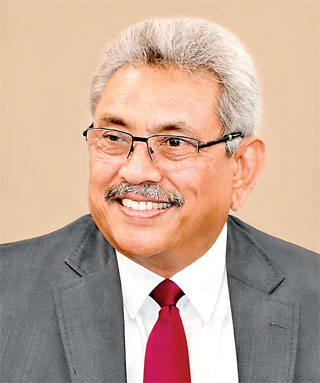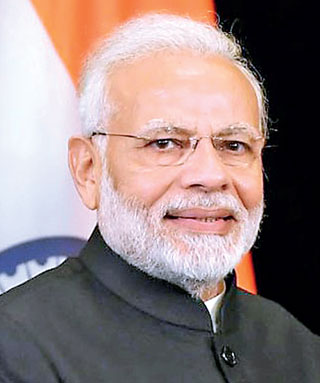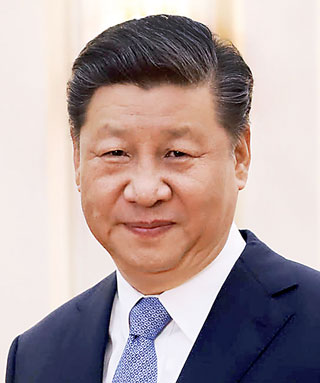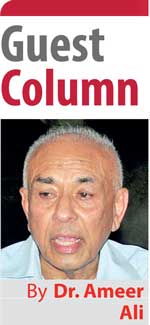Thursday Feb 19, 2026
Thursday Feb 19, 2026
Tuesday, 1 March 2022 02:52 - - {{hitsCtrl.values.hits}}

President Gotabaya Rajapaksa

Indian Prime Minister Narendra Modi

Chinese President Xi Jinping
It is high time Sri Lanka ensures the end of ethnonationalism of any shape and colour, which has ravaged peace and prosperity in this country for more than seven decades.
Countries whose levels of economic and social development were far below that of Sri Lanka in the 1950s are now far ahead of it while Sri Lanka is moving backwards towards a failed state. The ever-increasing demand from the young, educated and skilled for visas to migrate to foreign countries, which is shamelessly encouraged by government ministers, speaks eloquently about the socio-economic degradation of this once blessed island. How and why did this happen? 
What started in 1950s as a language issue for equal official recognition between Sinhalese and Tamil, was opportunistically grabbed by vested political interests and promoted to grow into a state-backed ethnonationalist ideology of Sinhala-Buddhist domination, which culminated in a majoritarian distorted democracy. As corollary to this dominance was the parallel relegation of minority communities to a subordinate status. Tyranny of majoritarianism ultimately disconnected nearly one-third of the country’s population from actively participating in and contributing to the development efforts of Sri Lanka.
Two years of aggressive Sinhala-Buddhist majoritarianism championed by the current regime has made Sri Lanka an international pariah. It was the injustices committed by the majoritarian regime that compelled UNHCR to put Sri Lanka on the dock and demand accountability for its human rights misdemeanours and ethnonationalist excesses. It thus becomes an absolute imperative for any future Government to cleanse this country of the scourge of ethnonationalism, if peace and prosperity were to return.
Ethnonationalism and authoritarianism are two characteristics that delineate GR’s presidency. He shines out as a two-in-one avatar of India’s Hindutva Narendra Modi and China’s authoritarian Xi Jinping. Modi demonstrated how political power could be snatched from the opponents by aggressively promoting ethnonationalism even if the economy were to perform badly as happened during his first term of government. Xi Jinping on the other hand showed how an economic miracle could be achieved through authoritarian rule.
President Gotabaya Rajapaksa emulated the two by welding together the ethnonationalist fervour of the first with authoritarianism of the second, and built his own image as an authoritarian Sinhala-Buddhist nationalist with a vision to lead the country towards “vistas of prosperity and splendour”.
After two years of this dream, all what this Government produced was economic and social dereliction. Facing economic and financial bankruptcy on one front, inter-communal discontent on another, international pressures on the third and the pandemic on yet another, the country is on the verge of anarchy. The welding of Sinhala-Buddhist ethnonationalism with authoritarianism has proven to be a dangerous cocktail that needs to be gotten rid of where peace and prosperity return. What are the prospects of that happening?
Before answering that question a few observations on the marriage of ethnonationalism with authoritarianism deserve attention. Modi’s aggressive anti-Muslim Hindutva campaign in 2019 brought victory to him and his party for the second time, even though Indian economy started losing its robustness and was slowing down. In fact, long before Modi came into Indian national politics, Sri Lankan politicians learnt already that economic issues would pale into insignificance once ethnonationalism occupies the centre stage of election propaganda and party canvassing. The Government’s insouciance towards the travails of a sinking economy is both an illustration of past experience and the Modi effect.
Sinhala-Buddhist ethnonationalism appears to govern every act of the current regime. For example, the recent destruction of the Jailani Mosque to make room for renovation and expansion of the adjacent Buddhist vihara in Kuragala closely resembles Hindutva destruction of Babri Masjid in Uttar Pradesh to construct a temple for Rama. Another was the construction of a Buddhist vihara in Hindu Kurunthamalai in the north. Before these was the desecration of the Hindu Neeraviyadi Pillayar Kovil in Mullaitivu orchestrated by that notorious Gnanasara Thera, who disregarded a court order and cremated the dead body of a Buddhist priest in the precincts of that temple.
There were several such incidents where Sinhala-Buddhist chauvinism demonstrated its arrogance, but tolerated by governments to win the support of Buddhist masses. However, such outlandish acts of chauvinism could backfire on those who promote them as the Modi regime witnesses now.
In India, chinks have started appearing in Modi’s ethnonationalist wall. For example, when his government wanted to push Hindi as the official language the south revolted and voices of secession once again started echoing from federal corridors. That discontent grew stronger when the Central Government discriminated against the more developed south in the allocation of development funds. As the southern states continue to develop strongly in comparison to other states and become more affluent, whether a victorious Hindutva Modi-led regime in Delhi could hold together the Indian federation is a moot point. This is why Indian intellectuals and political activists are fighting to bring back the rule of civic nationalism as enshrined in the nation’s founding constitution. There are obvious lessons to learn from the Modi model by GR and his regime.
Similarly, Xi Jinping’s authoritarianism also cannot remain solid even if China’s economic miracle continues to grow strong. As benefits of development percolate through society and as peoples’ basic needs are met and satiated, demand for other benefits would naturally emerge, and one such demand would be for political participation and democratisation.
The rise of the Hong Kong democracy movement is one clear example of this. Hong Kong was already a developed region before it was ceded by the British to China in 1997. Its greater economic affluence demanded greater freedom and autonomy from mainland China’s authoritarian control. Such demand for increased political autonomy and power sharing would also arise from within mainland China as economic affluence spreads.
Like Xi Jinping, GR too believes that development would solve problems of power sharing. This seems to be the reasoning behind his objection to implement the 13th Amendment.
Even in the most unlikely outcome of an economic miracle occurring at the expense of minorities, political stability is not guaranteed under the rule of GR’s ethnonationalism.
Unlike the ancient monarchs who seem to have had an exceptional ability to manage Sri Lanka’s pluralism, their modern counterparts who are imbued with dictatorial aspirations have a tendency to destroy that plurality in search of a monocultural society. This may be why GR is selectively picking elements from Xi Jinping’s experiments to create a homogenous Sri Lanka out of its heterogenous ethnic makeup. Just as Xi is experimenting with China’s Uyghur Muslims in trying to make them think and behave like the main Han community, GR too seems to be aspiring for the same as indicated by his One-Country-One-Law
agenda.
Like what Modi tried in India, GR is also attempting to make Sinhalese the only official language through stealth. One could see this in the gradual disappearance of Tamil in public signboards and in official letters received by Tamil speakers typed only in Sinhala. Recently, when GR went to open the Vavuniya University it was reported that security officers were busy removing Tamil writings on public sign boards.
This ethnonationalist carapace must be destroyed and the country should be rebuilt on a new foundation of civic nationalism with liberal democracy in which every Sri Lankan, be she/he Sinhalese, Tamil, Muslim, Burgher or whatever group or religion must have the same rights and obligations expected of any citizen. The biggest question facing the nation now is which political party or coalition of parties that are craving to wrest power from the ruling regime has the resolve and honesty to go before the people and say that it has the plan to do so and is prepared to show how it would be done.
Among the most important provisions in that plan should be (a) the abolition of executive presidency and re-empowering the parliament during the first year of the new government, (b) the removal of primacy for any religion in the national constitution while guaranteeing freedom of and from all religions, (c) bringing back English as one of the official languages, (d) guaranteeing independence of public institutions such as the Central Bank and Judiciary, which had been etiolated and emasculated, and turned into tools in the hands of governments, and (e) decentralising power through regional councils. The ultimate objective of these changes is to allow civic nationalism to grow and unite the country and take on the struggle for development.
Which political party or coalition of parties in the opposition is prepared to take up the cudgel, rally the masses behind it and cleanse the country of ethnonationalist politics?
(The writer is attached to the School of Business and Governance, Murdoch University,
Western Australia.)